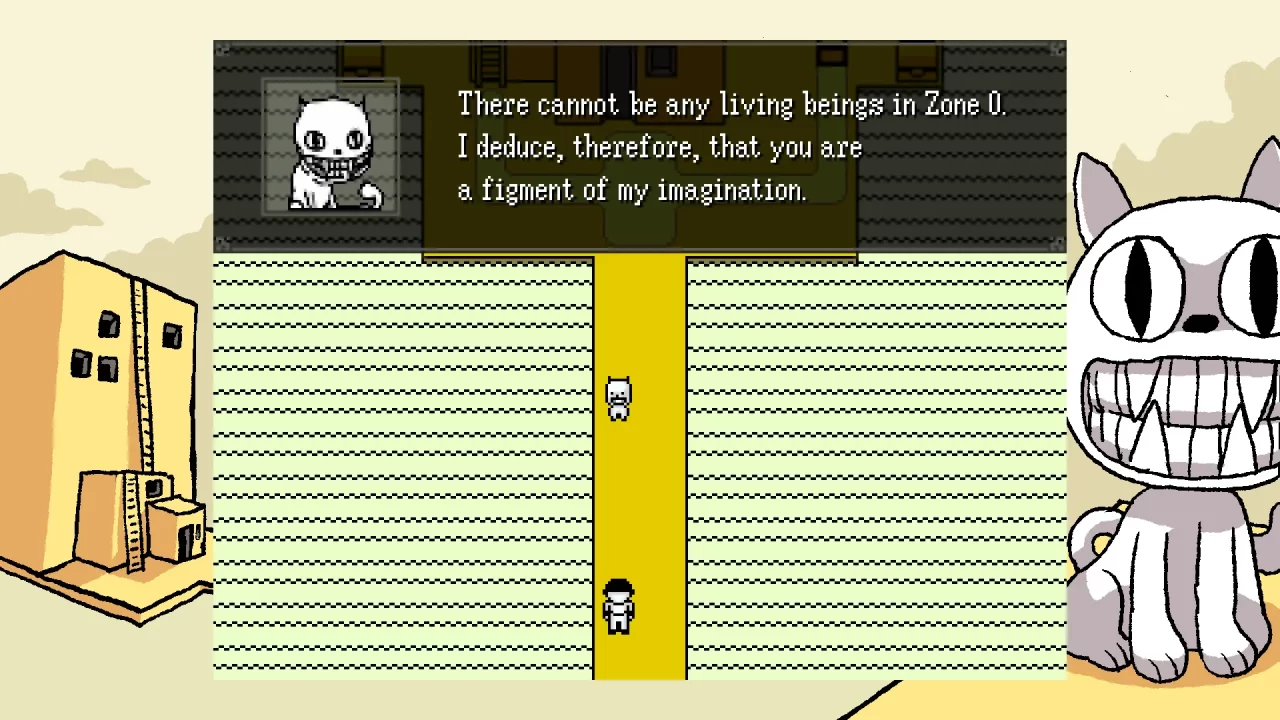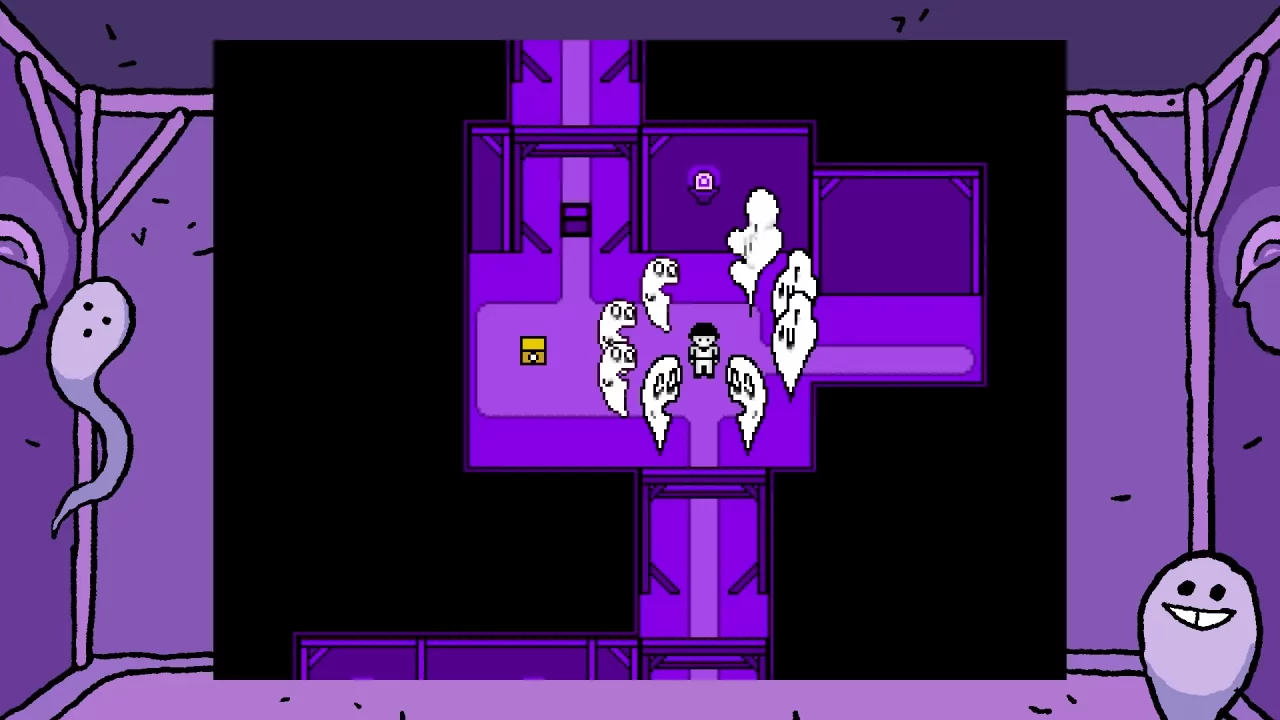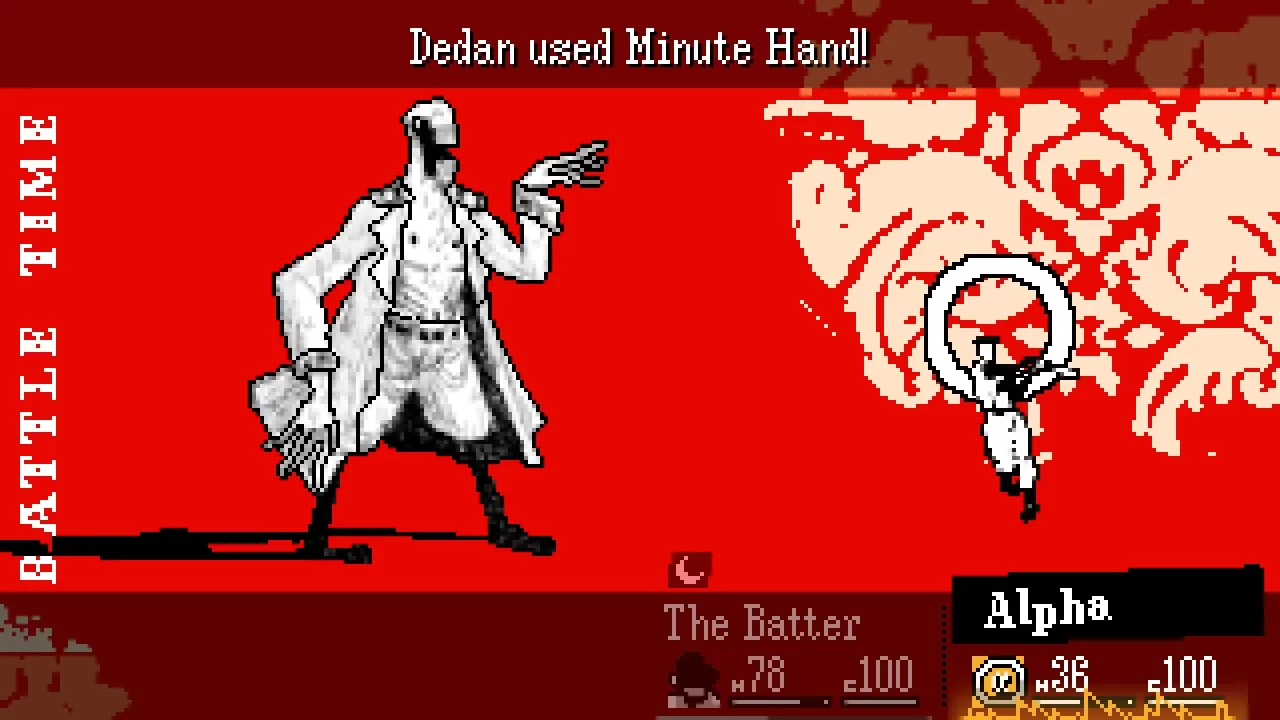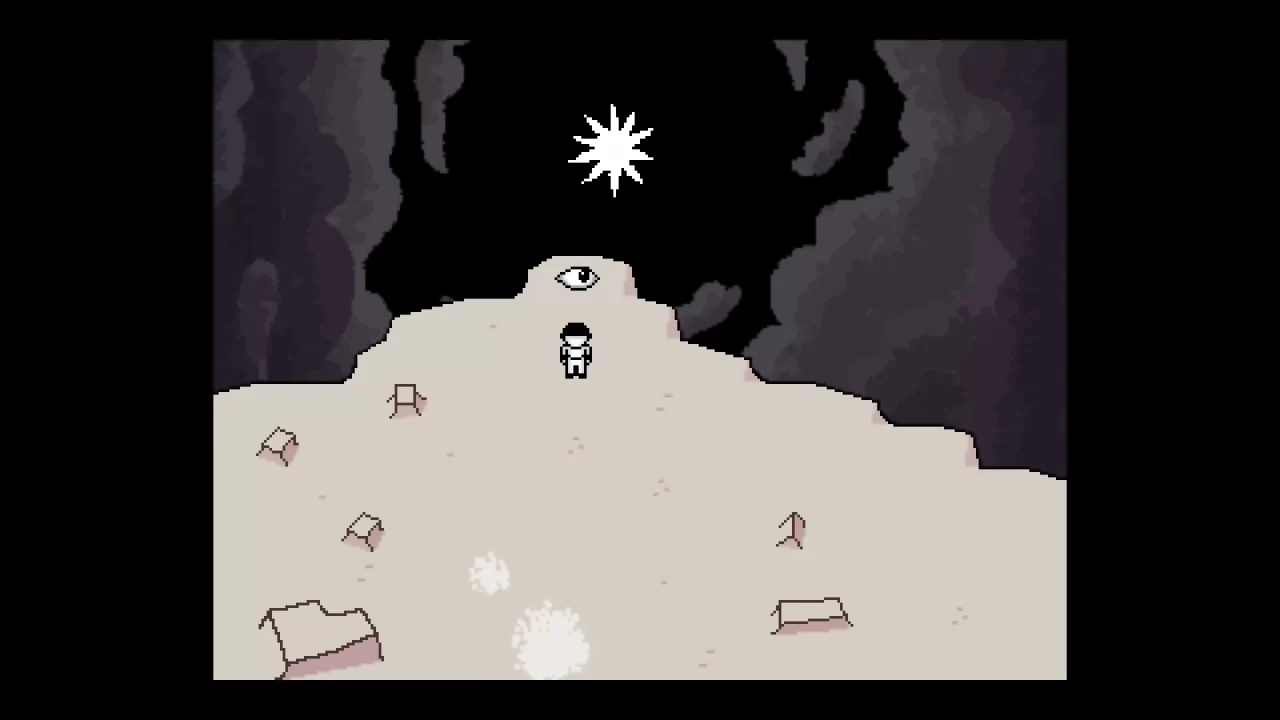OFF is one of the preeminent forbears of today’s wide variety of narratively off-kilter, classic JRPG-inspired indies. The original game, made in RPG Maker 2003 and released in 2008, ignited a creative spark whose radical flame burns in many hits to follow: from Space Funeral to LISA: The Painful to Undertale to Omori and countless lesser known passion projects. A lot of time has passed since then, and RPG Maker games and their spiritual kin have produced some of the most personal and thematically coherent RPGs of the last 15 years. As a newcomer to OFF, I was most curious whether this remaster still feels as fresh and impactful in retrospect as it must have been upon release.
I won’t beat around the switch. OFF doesn’t quite reach the heights of its most significant descendants, but it is fascinating to finally play one of their most blatant inspirations. It inducts the player into the story as Undertale does. It imports hand-drawn and other real-world assets into its aesthetics, like Omori. And, together with its spiritual cousin Yume Nikki, uses horror and the grotesque in a way that now feels signature to the RPG Maker canon yet wasn’t when it first released. Playing OFF for the first time in 2025 feels most rewarding as a history lesson full of “aha!” moments of creative recognition.
The game’s rich history is also important context for this rerelease. The original OFF was created primarily by Belgian solo developer Martin Georis (who goes by “Mortis Ghost”), with assistance from a few friends and the crucial work of composer Alias Conrad Coldwood. For Mortis Ghost, who aspired to be a comic book creator, it was just a freeware side project. In the following years, OFF earned itself a cult following with fans completing an unofficial English translation in 2011, as the original script was in French. It then proliferated on forums like Tumblr, where it captured the imagination of many young RPG fans (and future developers) ready for something so different and weird in the genre.
And weird it is. OFF’s story focuses far more on atmosphere and abstract expression than a coherent plot and characters to invest yourself in. You (the named player) are thrown into the cleats of The Batter. The Batter is an enigmatic and stoic protagonist who doesn’t offer much characterization beyond instinctively bashing every obstacle in his path and rehearsing plainspoken lines about how he must “purify” the world. Bit of a red flag, if you ask me. However, this world is frankly a mess, so maybe he has a point?
OFF’s fractured world is divided into levels simply named Zone 1, Zone 2, etc., that you progress through linearly. A tyrannical Guardian rules each one, deceiving and exploiting the Elsen, NPCs that work for them. Every Elsen has the same dead-inside salaryman appearance and doesn’t show any sense of individuality. There are Spectres causing havoc in the zones, who are depicted as hand-drawn assets in the game’s random encounters and can be impressively unsettling in their visual appearance. The Batter and Elsen believe that purging these Spectres will fix things. As the player, you quickly get the sense that something feels off about all this.
And now, you can experience The Batter’s journey in repackaged Unity form for $15 USD! Aside from the obvious appeal of playing an indie RPG on Switch, you may be wondering if anything else about the package warrants not downloading the totally free original from its wiki. Between an official English translation, revamped combat mechanics and balancing, nibbles of new content including secret bosses, and a redone OST, I’d say Mortis Ghost and publisher Fangamer have done enough to ask for some money—even if they could have swung higher.
Nevertheless, I don’t begrudge the decision to focus on preserving OFF while touching up its gameplay for a wider audience. Combat is quick, snappy, and demands a light yet satisfying degree of strategy throughout most of the game. The game adapts Final Fantasy’s ATB system, with visible bars for allies and enemies filling to determine turn order. Unlike the original release, time now pauses once any of your party members’ command menus pop up. There was also an effort to fine-tune the health and damage numbers. They also added a fun extra mechanic where your bar sometimes turns yellow, charging faster and signifying an upcoming critical. From what I’ve seen of the original game, combat is straight-up improved here. Are the mechanics overly familiar? Sure. But they’re executed well.
When you’re not “purifying” Spectres, you’re solving puzzles in the overworld. Pushing boulders, memorizing and inputting numbers, inserting lost pages into books: you know the drill. A few puzzles stuck out as particularly inspired, while some others were plain tedious. They work best as minor challenges that effectively add flavor to the exploration and background of each zone.
Aside from the remaster’s fresh coat of polish, the new content advertised here amounts to a slightly expanded endgame with secret bosses. The bosses themselves are a welcome inclusion that provides more narrative clues (though certainly not answers) and dramatic tone-setting before the finale. I only wish that Mortis Ghost used this as an opportunity to revise and/or expand the endgame further, as it ultimately feels underdeveloped and unrewarding.
The endgame involves backtracking through each of the game’s main zones. The zones are now streamlined, emptied, and full of encounters with only one enemy type each that you inexplicably are not allowed to escape from. As a result, what could have been a seamless and fleshed-out buildup to the game’s climax becomes a tedious, repetitive sequence.
This portion even fails to provide the usual dopamine draw of a good endgame. The equipment I found off the beaten path was usually worse than what my team was already using, so my only reward was more random encounters. And the boss fights, while cool, did not provide any truly demanding superboss thrills or unlock a new ending path. I’m usually the guy who’s willing to excuse this kind of thing if there’s a narrative justification—and I suppose there is—but as the venue for this release’s new content, I hoped for more.
The most significant, and potentially divisive, creative difference between the original version of OFF and the remaster is an entirely new soundtrack. I imagine existing fans will feel attached to Alias Conrad Coldwood’s OST, which I’ve gone back to listen to in context. There’s no denying Coldwood’s OST suits the game. Its homegrown mixing, contemporary lo-fi stylings, and haunting soundscapes feel perfect for a freeware solo dev indie project. A curious Redditor reached out to Coldwood seeking answers regarding why their original OST wasn’t used. Apparently, it came down to not owning the license to the samples they used (which is problematic for a commercial release as opposed to a free one) and being generally distrustful of these kinds of contracts (fair enough).
With that said, the new OST—courtesy of Toby Fox, Morusque, and a few other contributors—was one of the highlights of my playthrough. The tone may not feel as consistently coherent as Coldwood’s work, but the songs hit harder. As examples, here’s the original battle theme versus the new one, and the original Zone 1 music versus the remaster’s interpretation. For me, the new OST is generally more robust and enjoyable, while the original excelled with its uniquely twisted ambiance. There’s no easy either/or pick here. Fortunately, Coldwood’s vision will always remain available in the game’s freeware version.
I already touched on OFF’s story a bit, but I want to circle back to it. After all, the reason people like me gravitate towards a game like OFF isn’t for the joy of playing yet another traditional, mechanically indistinct turn-based RPG. It’s to see what the developer thought to do with that framework to provide a unique narrative experience. It’s to find out that the four elements of this world aren’t Earth, Wind, Fire, and Water; rather, they are Metal, Smoke, Meat, and Plastic. Or that recovery items have names like Luck Ticket, Silver Flesh, and Moloch’s Meat. I love that.
Why are those the four elements here? Why is our angel-of-death protagonist decked out in baseball gear? What are we accomplishing by purifying the Spectres? Why did the developer decide to make our party members simple circles named after letters of the Greek alphabet? If you want to think about these questions without having any of them lucidly answered, OFF is the game for you! I’m not even throwing any shade. While I was sometimes skeptical of the story’s stubborn obtuseness, it won me over within a day of finishing it.
OFF‘s writing is near average, other games have far surpassed its fourth-wall knocking, and the characters are barely developed. Despite all this, OFF’s story ultimately has enough going on to linger in the mind like a benign tumor. Everything from The Batter’s goals to those of his adversaries remains barely intelligible. Maybe the story is metaphorical; maybe it’s literal. Beneath all the subverted RPG trappings, there seems to be some sort of familial psychodrama informing OFF’s world. If you ask the creator, many of these details are arbitrary. The important thing is it doesn’t feel that way, though. Like a classic surrealist film, I found OFF’s greatest strength to be that I spent time wondering what all this could mean after having soaked it all in.
OFF deserves a lot of credit for its creative accomplishments. I’m pleased that this remaster gives us the opportunity to pay it its dues while acknowledging the ways it has been artistically surpassed. It’s the type of creative project that lights a torch for others to carry into even more daring places. Still, with its arthouse stylings that resist easy interpretation, OFF retains its own identity enough to make it well worth recommending to this day. Whether you’re more interested in the game out of historical curiosity or to bask in the dread oozing from its presentation, OFF still has a lot to (don’t do it man, don’t do it)… offer.






